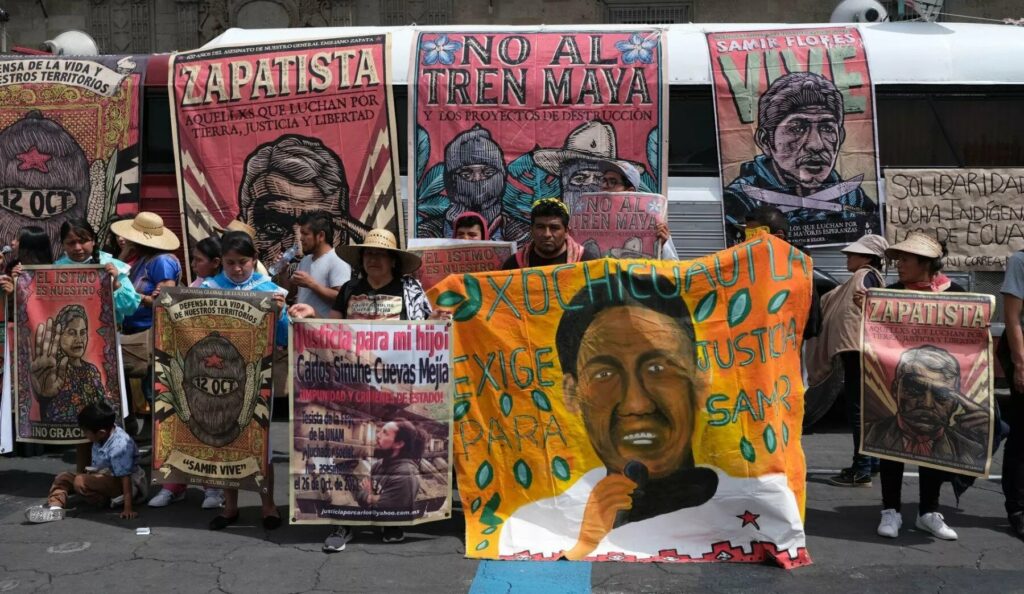
The United Nations High Commissioner for Human Rights (UN-HCHR) Office in Mexico recalled that at least 46 indigenous defenders have been murdered or disappeared since 2019 without justice for more than 90 percent of the cases.
According to UN-HR records, in only one of the cases was a conviction issued against the aggressors. Jesús Peña Palacios, the organization’s deputy representative in Mexico, denounced that “this impunity aggravates the structural discrimination experienced by indigenous peoples and the difficulties they encounter in accessing justice.”
“An effective investigation in accordance with the standards of due diligence, which ensures that those responsible are brought to justice, sends the clearest message that these terrible acts will not be tolerated,” said Peña Palacios on August 9, in the framework of the International Day of the World’s Indigenous Peoples.
)He added that indigenous leaders of the peoples and communities “are more exposed to reprisals or violent actions as a result of their visibility in the defense of their territory and way of life”, and that their murder or disappearance “has a chilling effect” on their entire community, “which inhibits and hinders the exercise of their human rights”.
The UN-DH recognized “the valuable legacy of the indigenous people who have been murdered or disappeared for defending their rights, peoples and communities”, and urged the authorities of the three levels of government to guarantee a safe environment for the exercise of their rights, based on a preventive approach that guarantees the non-repetition of acts of violation.
The figures for murders of indigenous defenders in Mexico could be higher. According to the Mexican Center for Environmental Law (Cemda), in 2022 alone, the Mexican government at its different levels was “primarily responsible” for the 582 aggressions committed against defenders of land and environmental human rights in the country. That year, of the total number of aggressions, 24 were murders of land and territory defenders. In addition, 54 percent of the attacks were committed against members of indigenous communities defending their territory from extractive projects, especially those in the mining sector.

Below is the full communiqué:
On the International Day of Indigenous Peoples, the Office in Mexico of the United Nations High Commissioner for Human Rights (UN-HCHR) recognizes and keeps present the valuable legacy of indigenous people who have been killed or disappeared for being defenders of their rights, peoples and communities, and calls on the authorities of the three levels of government to redouble their efforts to create a safe environment for the exercise of their rights, based on a preventive approach and that guarantees the non-repetition of violent acts against defenders.
Seventy-five years after the adoption of the Universal Declaration of Human Rights, a historic event in the recognition of equality and non-discrimination of all people, important challenges persist for the full realization of the rights of indigenous peoples.
“In Mexico, in addition to the structural challenges that have affected indigenous peoples, generating significant gaps regarding inequality, marginalization and access to their rights, indigenous peoples also face violence from different actors, including organized crime groups, who dispute the control of their territory. Leaders of these peoples are particularly exposed to reprisals or violent actions due to their visibility when defending their territory and way of life. Their assassinations or disappearances have a chilling effect on all indigenous people, inhibiting and hindering the exercise of their human rights,” said Jesus Peña Palacios, UN-DH Deputy Representative in Mexico.
Since 2019, UN-HR has registered at least 46 cases of indigenous defenders (43 men and 3 women) who were murdered or disappeared having a likely link to their defense work, constituting almost 30% of all cases of murdered or disappeared human rights defenders known to UN-HR Mexico in that period. Eight of the victims are still missing.
In 32 of the 46 cases, the indigenous defenders were working on environmental issues and in 33 cases had suffered previous security incidents, which were reported in 10 cases. In terms of geographic distribution, the states with the highest recurrence of registered cases were Oaxaca with 20 cases, Chihuahua with 5, Guerrero with 4, Michoacán with 4 and Chiapas with 3.

The Protection Mechanism for Human Rights Defenders and Journalists has made progress in the adoption of protection measures in cases of indigenous human rights defenders. Likewise, in recent years the Mexican State has begun to define legal plans to address the context in which indigenous peoples live. However, the recorded figures of homicides and disappearances of indigenous people are a call to redouble efforts to adopt measures that guarantee them a safe and favorable environment and avoid acts of stigmatization, delegitimization, criminalization and violence against them, especially in the context of the design and implementation of development projects.
Mexico was one of the countries that promoted the adoption of the Escazú Agreement. The full implementation of the obligations contained in the Agreement, particularly with regard to the rights of access to environmental matters, will strengthen the protection of indigenous human rights defenders.
Of the 46 cases known to UN-HR, only one has resulted in a conviction against the perpetrators. “This impunity aggravates the structural discrimination experienced by indigenous peoples and the difficulties they face in accessing justice. An effective investigation in accordance with due diligence standards, which will bring those responsible to justice, is the clearest message that these terrible acts will not be tolerated,” added Peña Palacios.
The investigation of the murders and disappearances must include all possible lines of investigation, including the possible link between the crimes and the human rights activities of the victims, as well as the effective incorporation of a gender and intercultural perspective. UN-DH trusts that the actions carried out to date by the competent authorities will allow for the prompt clarification of the facts and the punishment of those allegedly responsible.
Finally, UN-DH expresses its deepest sympathy to the families of the persons who are still missing and its deepest condolences to the families and friends of the murdered persons.
